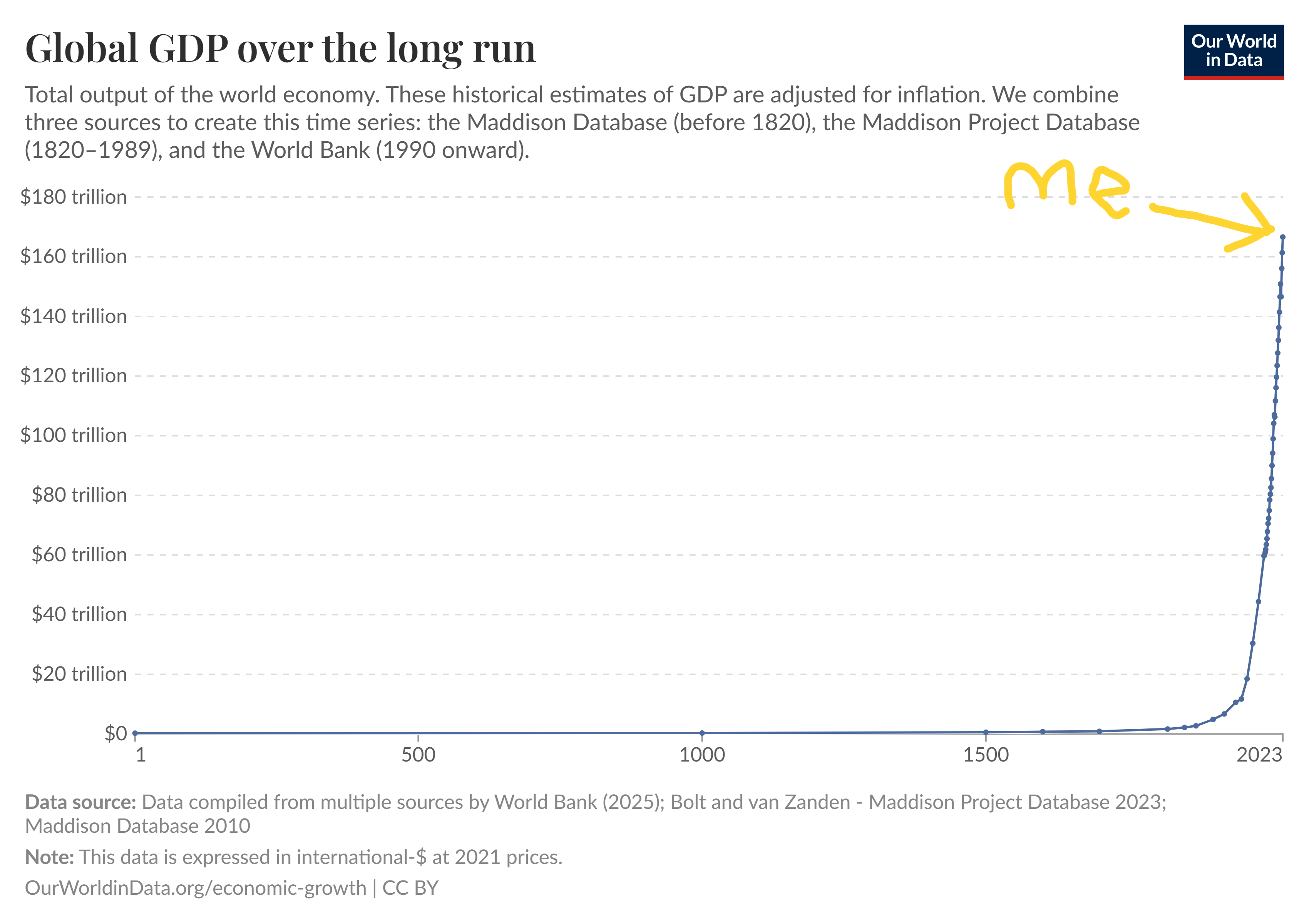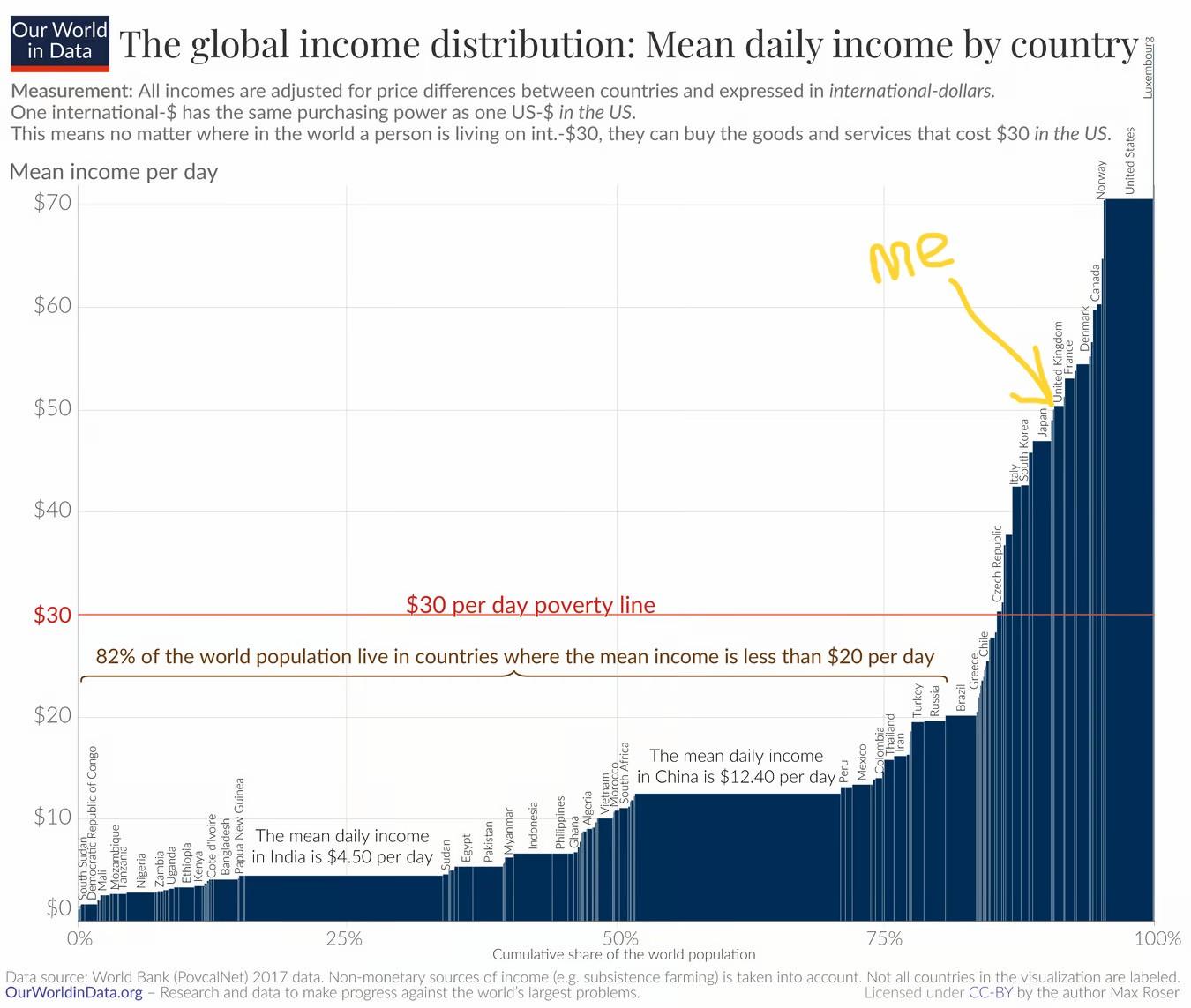TL;DR: I’ve donated to some high-impact charities in animal welfare, malaria prevention, and poverty reduction, and it’d be amazing if you considered doing the same. While I think money given to any of these interventions has at least two orders of magnitude more impact than the average, animal welfare is perhaps 100x as impactful per dollar as malaria prevention, which in turn has a 10-20x advantage over direct cash transfers.
When I’m choosing what to write about here, normally I pick topics that feel especially exciting or interesting in that moment – but that means that there’s a skew away from the issues I consistently think are important, like transformative AI or altruism. This is a first attempt to push back against that and focus on something I care a lot about but which now, to me, feels mundane: taking the Giving What We Can🔸10% Pledge to donate one-tenth of my income to high-impact charities. Donations I’ve made since making the pledge have moved over £10,0001 to effective charities that are making the world a better place in a cost-effective, evidence-based way. When given to global health charities like the Malaria Consortium, that much money will save around two human lives(!!!), and I don’t think my quality of life has been affected at all (if anything, I’m happier for giving the money; I otherwise would’ve just been saving it).
Many of my friends will be working at well-paid internships this summer. I’ve written this post partly for you, and I’d be really thrilled if you considered donating some fraction of your earnings to charity, or even trialling an ongoing commitment to donate. If you don’t want to read on, three specific places I think it would be great to donate to (with the best first) are improving animal welfare, preventing malaria, and directly transferring cash to people living in global poverty.
In the rest of this post, I’m going to explain some of the considerations which give me conviction that donating is a good thing to be doing, with the hope that others will also find them a persuasive spur to action. Pride is a sentiment I’ve historically been quite allergic to, and talking about money or donations feels rather offputtingly gauche & self-aggrandising, but I think the topic is important enough to push through the awkwardness and write this piece anyway. The world would be more just and have more flourishing if we had a stronger norm of the well-off donating to charity, and I want to help promote this culture of giving. Plus, I do feel pretty pleased with myself for making & following through on such commitments. (Here’s a secret: you could, too 😉)
Putting our exceptionally good fortune into perspective
A near-miraculous series of coincidences has put me where I am:
-
I’m lucky to be living in the 21st century, rather than an earlier era

Source: https://ourworldindata.org/grapher/global-gdp-over-the-long-run -
I’m lucky to have been born in a peaceful, rich, post-industrial country – where someone lives explains over two-thirds of present variation in incomes

Source: https://ourworldindata.org/higher-poverty-global-line -
I’m lucky that my parents were highly-educated, and that they could invest a lot of human and financial capital into bringing me up
-
I’m lucky to have a predisposition towards interests and talents that are particularly useful in a world oriented towards cognitive work
I think it would be crazy to say that I “deserve” all this luck more than any other person does, and so it seems clear that I don’t have a super-special claim on the resources I’ve happened to end up with. Sure, I could just use them for myself, but – for want of better words – that just wouldn’t be a kind or virtuous thing to do. (Scott Alexander and Bentham’s Bulldog, amongst others, write about this with better humour and more patience than I have.)
What might feel like a small salary in the UK is still substantial when compared to the developing world. If you play around with the “How Rich Am I?” calculator, you’ll see that a single adult living in the UK with £20,000 in post-tax income is in the richest 7% of the global population – even accounting for differences in the cost of living.

One thing that’s difficult for me here is imaging what it’s like living on $3.30 a day, or for the 700 million people in extreme poverty who consume less than $2 a day. Fortunately, there’s an incredible website called Dollar Street where you can see photos of families at every level of income, with snapshots of daily life through toothbrushes, footwear, toys, stoves, and suchlike – and get an important & emotional reminder that each one of those aforementioned 700 million people is an individual with skills, ambitions, loved ones.
How I decided where to give
Informing my donations are three beliefs (slightly simplified for ease):
- It is better to help more people than fewer.
- Suffering is roughly as bad (and flourishing roughly as good) wherever it happens and whoever experiences it.
- Non-human beings with the capacity for pleasurable and painful experiences also matter morally.
Knowing that my money could go much further abroad than in the UK, the first half of my donations were to global health charities doing things like distribute anti-malaria bednets. (Perhaps surprisingly, this is about 10-20x, which I think is due to economies of scale and it being hard for individuals to accurately calculate their own expected utility from purchasing bed nets.)
My more recent donations were to animal welfare charities, which is what I expect to support going forwards. I’ve been vegan for a while, but I felt very uncomfortable with the idea of giving money to help animals when there are so many humans suffering today. In the end, I changed my mind after reading a set of posts arguing that interventions in animal welfare can be dramatically more cost-effective than the best global health charities, because of how neglected the horrors of factory farming are. (There are over 80 billion animals slaughtered for meat each year, most of whom live in factory farms where they frequently have teeth, tails or horns removed without anaesthetics; are crammed into cages without space to turn around; are killed by boiling alive or throat-cutting. All this in spite of there being strong scientific evidence that non-human mammals and birds have conscious experiences, and substantial research into welfare markers of other animals.)
Maybe you’re unconvinced that non-human animals are an appropriate object of moral consideration. I haven’t written this post to persuade you – but whatever your views on which causes matter most, I’d still encourage you to donate to one of the GWWC-recommended orgs, since they can have hundreds of times more impact per dollar donated than the median charity does.2
I do find that the GWWC website can be a bit overwhelming with how many charities they list, so usually I just donate to one of their cause area-specific funds and defer to their experts about where the best place to direct the money is. They have funds for:
Why 10%?
You might wonder why I’ve set the lower bound for my donations at 10%. Would 9% not be good enough? What makes me think failing to give 11% would be excusable?
I’m the first to admit that one tenth is an arbitrary figure. There’s not much reason to settle on it, except for the fact that it’s a nice round number (and GWWC chose it as their Schelling point). Some people in the Effective Altruism community donate half their income or more, and I’m planning to increase my giving in future. Over my lifetime, I expect that I’ll donate most of my income/wealth, and (absent catastrophe) the vast majority of those donations are yet to come. But it’s important to me that I make non-trivial donations now as well as later, so that I don’t drift away from my current values. For the time being, I’ve settled on “at least 10%” as a pledge which provides that anchoring without making me feel discouraged or resentful, even though I could very well commit to more immediately.
As I say on the homepage, morality is not all-or-nothing. I could be doing more, and that would be better, but we must all start somewhere. Will you?
-
I’ve been careful with my language here in order to be precise about the figures. The amount of donations I have made is slightly under £10,000, but with multipliers like Gift Aid, that translates into over £10,000 received by the charities I’m supporting. It’s also the case that the total amount of money I have donated or set aside to donate is greater than £10,000; I just batch my donations together for logistical reasons and didn’t think this post should wait until the end of 2025 (by when I will have actually donated comfortably over £10,000). ↩︎
-
Added on 10 May: Some more careful analysis by Ben Todd adds nuance to this: differences in impact between cause areas are probably around 100-1000x, whereas the difference between interventions in a given cause area is smaller, perhaps more like 2-10x. (And if people choose interventions randomly, the expected impact is the mean, not the median, so comparing the best charities to the median gives an unfairly low baseline, given a heavy right-tail on the distribution.) Overall, then, you can get several orders of magnitude in impact between the best charities vs average (and certainly between the best charities and the worst, since some have zero or even negative impact), but the initial cause prioritisation is where you can get the largest gains from following the data & evidence. ↩︎